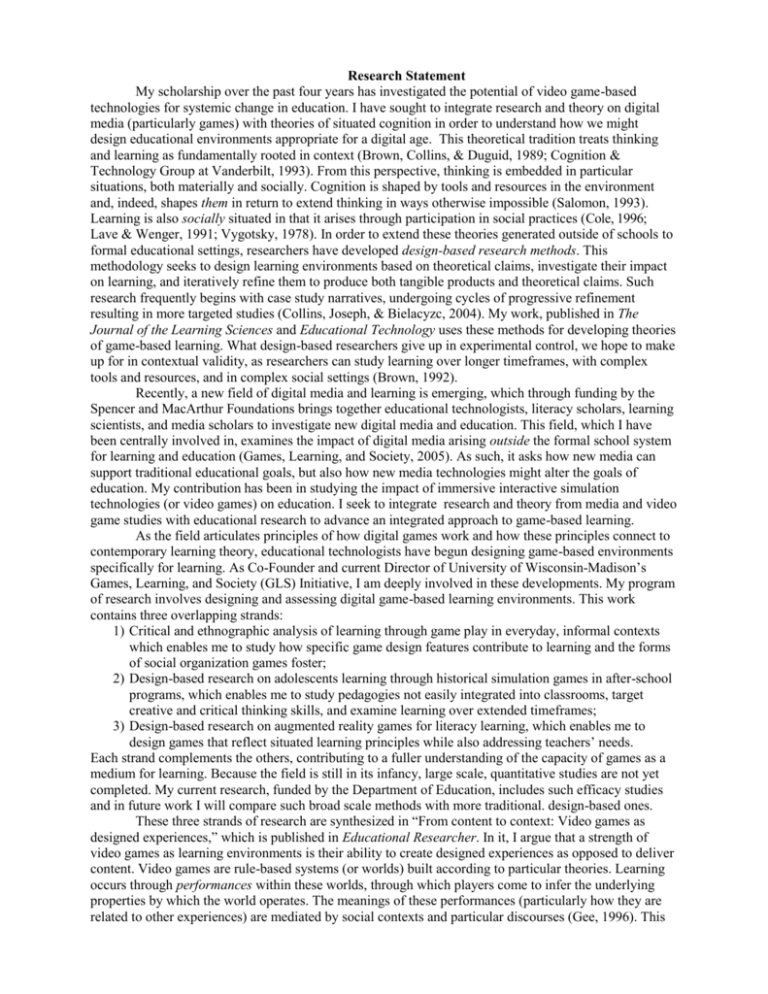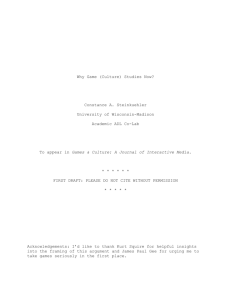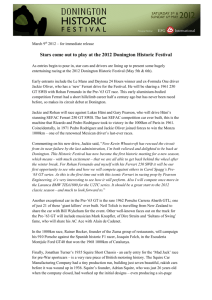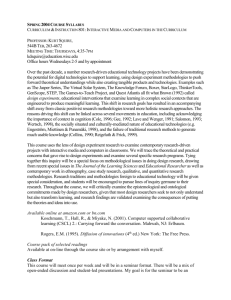Research Statement - Network and Web Help Documents >> start
advertisement

Research Statement My scholarship over the past four years has investigated the potential of video game-based technologies for systemic change in education. I have sought to integrate research and theory on digital media (particularly games) with theories of situated cognition in order to understand how we might design educational environments appropriate for a digital age. This theoretical tradition treats thinking and learning as fundamentally rooted in context (Brown, Collins, & Duguid, 1989; Cognition & Technology Group at Vanderbilt, 1993). From this perspective, thinking is embedded in particular situations, both materially and socially. Cognition is shaped by tools and resources in the environment and, indeed, shapes them in return to extend thinking in ways otherwise impossible (Salomon, 1993). Learning is also socially situated in that it arises through participation in social practices (Cole, 1996; Lave & Wenger, 1991; Vygotsky, 1978). In order to extend these theories generated outside of schools to formal educational settings, researchers have developed design-based research methods. This methodology seeks to design learning environments based on theoretical claims, investigate their impact on learning, and iteratively refine them to produce both tangible products and theoretical claims. Such research frequently begins with case study narratives, undergoing cycles of progressive refinement resulting in more targeted studies (Collins, Joseph, & Bielacyzc, 2004). My work, published in The Journal of the Learning Sciences and Educational Technology uses these methods for developing theories of game-based learning. What design-based researchers give up in experimental control, we hope to make up for in contextual validity, as researchers can study learning over longer timeframes, with complex tools and resources, and in complex social settings (Brown, 1992). Recently, a new field of digital media and learning is emerging, which through funding by the Spencer and MacArthur Foundations brings together educational technologists, literacy scholars, learning scientists, and media scholars to investigate new digital media and education. This field, which I have been centrally involved in, examines the impact of digital media arising outside the formal school system for learning and education (Games, Learning, and Society, 2005). As such, it asks how new media can support traditional educational goals, but also how new media technologies might alter the goals of education. My contribution has been in studying the impact of immersive interactive simulation technologies (or video games) on education. I seek to integrate research and theory from media and video game studies with educational research to advance an integrated approach to game-based learning. As the field articulates principles of how digital games work and how these principles connect to contemporary learning theory, educational technologists have begun designing game-based environments specifically for learning. As Co-Founder and current Director of University of Wisconsin-Madison’s Games, Learning, and Society (GLS) Initiative, I am deeply involved in these developments. My program of research involves designing and assessing digital game-based learning environments. This work contains three overlapping strands: 1) Critical and ethnographic analysis of learning through game play in everyday, informal contexts which enables me to study how specific game design features contribute to learning and the forms of social organization games foster; 2) Design-based research on adolescents learning through historical simulation games in after-school programs, which enables me to study pedagogies not easily integrated into classrooms, target creative and critical thinking skills, and examine learning over extended timeframes; 3) Design-based research on augmented reality games for literacy learning, which enables me to design games that reflect situated learning principles while also addressing teachers’ needs. Each strand complements the others, contributing to a fuller understanding of the capacity of games as a medium for learning. Because the field is still in its infancy, large scale, quantitative studies are not yet completed. My current research, funded by the Department of Education, includes such efficacy studies and in future work I will compare such broad scale methods with more traditional. design-based ones. These three strands of research are synthesized in “From content to context: Video games as designed experiences,” which is published in Educational Researcher. In it, I argue that a strength of video games as learning environments is their ability to create designed experiences as opposed to deliver content. Video games are rule-based systems (or worlds) built according to particular theories. Learning occurs through performances within these worlds, through which players come to infer the underlying properties by which the world operates. The meanings of these performances (particularly how they are related to other experiences) are mediated by social contexts and particular discourses (Gee, 1996). This framework emphasizes that game-based learning is deeply experiential; as a medium, games operate through an aesthetic of experience. I have updated and extended this framework into approaches for designing games for learning through an article in press at Teacher’s College Record. I. Critical and ethnographic analysis of video games and cultures in everyday informal contexts My first strand of inquiry focuses on understanding the underling design principles of games and how people learn through playing them. In “Educating the Fighter” (2004), I analyze the game Viewtiful Joe to understand how its design and attendant social structures support mastery learning in players. The game orders problems so that they teach players the underlying rules of the game system. “Bosses” at the end of levels function as tests, requiring players to consolidate learning and extend their skills into more complex situations (something known to enhance transfer of learning). This learning is supported by the game community, which uses various practices to make expert game play visible to the novice. My research approach treats video games as a social practice embedded in social contexts, and in the cases of multiplayer games, involving the creation of sub-cultures. In “Generating CyberCultures: The Case of Star Wars Galaxies,” Constance Steinkuehler and I (2006) conducted a mini-ethnography of the game Star Wars Galaxies to examine how game makers design for emergent behavior. Designers use game structures, which we call driving activities, to foster some activities (and not others). In such contexts, learning can be described as learning cultural practices, suggesting that educational game designers might begin by asking what practices students ought to experience (say, those of a scientist). In “The higher education of gaming” (Squire & Giovanetto, in press), my basic research on games directly informs design research. This study investigates Apolyton University, a self-organizing community of Civilization 3 players who design custom game scenarios. I study how their online “curriculum” dissects the underlying game model and teaches novices to become experts. I outline the trajectory by which players go from game players to designers (i.e. expert players who use custom scenario creation tools to express historical themes). Using interviews with expert players, we show how individuals use the game to understand both historical and current events, a form of game play we call “historiographic gaming.” II. Supporting Productive Literacies Through Historical Simulation Gaming My second strand of inquiry addresses an emerging equity gap by researching the potential of historical simulation games to help students (1) gain missing “background” knowledge, (2) develop analytic and creative problem-solving skills, and (3) form new identities as producers and consumers of knowledge in world history. Supported by the MacArthur Foundation, this research investigates whether an after school gaming program modeled after high-end gaming cultures (examined in inquiry strand I) can engage kids in historiographic gaming, a form of productive play involving the creation of historical scenarios. I investigate the impact of such practices on aspects of students’ lives ranging from school performance to career aspirations. “From users to designers: Building a self-organizing game-based learning environment” (2005) is a case study that details this model of “after school gaming centers” and describes how players transition from uninterested neophytes to expert players. In it, I argue for a model of “self-organizing gaming communities” that details what learning appears (e.g. factual knowledge of maps and civilizations, systemic thinking about historical models), the role of expert facilitators in opening new learning trajectories for students, and how particular design features, such as collaborative play, can be used to increase self-efficacy, especially among females. In this after school context, I study the longitudinal development of participants, especially in terms of the cognitive impact of sustained participation in the program. Participants in our study design custom scenarios based on a combination of personal interest in actual historical events, particular game strategies, and social role within the group. In “Designing centers of expertise for academic learning through video games” (in press), I analyze how expertise in this context emerges, generating increased knowledge of historical facts, increased use of causal models for historical thinking, and, based on selfreports, increased social studies grades. Based on these cases, I then propose a model for educational programs using new media literacies to improve performance in school called centers of expertise that highlights their potential to lead to new interests and identities outside of school as well as within. I review and theorize this model for educational gaming more broadly in “Possibility Spaces: The Design of Learning Environments for the Interactive Age” (in press). III. Designing Games for Learning: Local Augmented Reality Games on Handheld Computers My third and final strand of inquiry focuses on the design of games built intentionally for learning based on situated learning theory – here, using controversial, local issues as a context for fostering scientific literacy. In “ Developing a Platform for Augmented Reality Gaming,” Eric Klopfer and I (in press) articulate a research-driven approach for developing new pedagogies based on emerging technology platforms. Augmented reality games builds on the capabilities of mobile computing technologies – specifically, their portability, social interactivity, context sensitivity, connectivity, and individuality. In augmented reality games, students role play as professionals investigating fictional but plausible dilemmas in their own communities. Students take handheld computing technologies into real world locations and access virtual data layered upon the world (using GPS technology) – in effect, turning the real world into a game board. In a recent article published in The Journal of the Learning Sciences (Squire & Klopfer, 2007) we show how such games can integrate situated and socio-cultural theories of cognition. The potential to engage participants in scientific argumentation is illustrated in a paper published in The Journal of Science Education and Technology which analyzes participants’ scientific reasoning while playing an augmented reality game based on the economic, social, and environmental issues surrounding Madison’s Lake Mendota. In it, I show how such games can elicit complex forms of scientific argumentation and specify the design features that contribute to it. Supported by a $1.5 million grant from the Department of Education, this final strand of my research leverages an understanding of video games and game culture (developed in the first and second strands) to engage alienated students failing in school in literacy practices. In the past year, I have worked with a team distributed across UW, MIT, and Harvard University on this grant to refine this gaming platform for broader dissemination, to develop curricular models that integrate it into classroom practices, and to investigate its impact on student learning. Research challenges include how to make game-based learning feasible; how design games flexible enough to be adapted to local contexts; and how to create games (and communities and activities around them) that are portable, scalable, and yet relatively inexpensive. Research findings have driven me toward a place-based approach to augmented reality gaming, an approach articulated in “Wherever You Go, There You Are: The Design of Local Games for Learning” (2007), which compares case studies across several game implementations. We are partnering with thirty classroom teachers to further test the impact of such games on learning. The first findings from this research, to appear in Teacher’s College Record, argues that local games can trigger students’ pre-existing knowledge, enlist students’ identities as active problem solvers, and promote scientific argumentation. Gains in students’ academic performance in terms of reading comprehension, persuasive and expository writing, and self-efficacy in science and language arts are currently under analysis. Next year, we will conduct controlled experiments that compare performance in 30 classes in an experimental condition to 30 classes in a control condition. Future Research Together, these three strands of inquiry constitute my program of academic research to date. In my immediate future, I plan to further analyze the large data sets that my research team has accumulated across projects. Consistent with the “progressive focusing method,” I will begin experimental studies comparing game-based instructional methods with more traditional ones. With the historical games, I have partnered with Florida Virtual Schools to run experimental and control curricula in their classes to examine differences in students’ performance. With the augmented reality games, we are currently running controlled experimental studies to assess learning. Several of my doctoral students (credited as coauthors in prior citations) are now completing dissertations on these projects. In my next phase of work, I plan to further integrate this research through the design of integrated game-based learning systems. Such a system, outlined in both my NSF CAREER Grant proposal and our IES Instructional Technology Center grant, would integrate the forms of academic role playing employed in the “augmented reality games” with the simulation, design, and social learning principles of “centers of expertise.” The goal would be to examine the extent to which learning systems based on these combined design principles can improve both traditional academic skills (such as reading comprehension and scientific argumentation) and thinking skills that are hypothesized to be critical to the “new economy” (such as thinking in groups, leadership skills, and creative problem solving with technology). To accomplish this work, I hope to grow the GLS Initiative here at the University of Wisconsin-Madison into a bona fide Center that focuses on the study of new media environments (particularly games) in education. My goal is to bring together faculty studying new media across departments on campus including education, communication arts, computer science, and visual arts in order to keep the University of Wisconsin-Madison globally competitive in this area. With the MacArthur Foundation, The Department of Education, and the National Science Foundation all supporting video games and learning, competing initiatives have also been founded at MIT, Harvard, Stanford, USC, UCLA, the University of Washington, and Indiana University, among others. My goal is to further a “distinctly Madison” approach to this research by focusing on the use of such technologies not just to reify traditional educational structures but also to transform them. If video games are emblematic of a paradigmatic shift from print culture to digital culture, then there is reason to believe that games-based learning might offer us new, more refined models of learning that might better meet the needs of this new digital era. Research Overview Chart Theoretical and Synthetic Scholarship Squire, K. (in press). Video games literacy: A literacy of expertise. To appear in M. Knobel, D. Leu, & C. Lankshear, Handbook of Research on New Media Literacies. New York: MacMillan. Squire, K. (in press). Video Games and education: Designing educational systems for an interactive age. To appear in Educational Technology. Squire, K. (2008). Open-ended video games: A model for developing learning for the interactive age. In K. Salen (Ed.) The T. MacArthur Foundation series on digital media and learning, (167-198) Cambridge, MA: The MIT Press. Squire, K. (2007). Games, learning, and society. Building a field. Educational Technology, 4(5), 51-54. Squire, K. (2006). From content to context: Videogames as designed experiences. Educational Researcher, 35(8), pp-19-29. First Strand of Inquiry: Second Strand of Inquiry: Third Strand of Inquiry: Critical and ethnographic analysis of video Supporting productive literacies Designing games for learning: Local games & cultures in everyday contexts through historical simulation gaming augmented reality games on handheld computers Video Game Analysis Squire, K.D. (2004). Sid Meier’s CivIII. Simulations & Gaming, 35(1): 135-140. Squire, K.D. (2005). Educating the fighter. On the Horizon 13(2), 75-88. Jenkins, H. & Squire. K. (in press). Applied game theory: Innovation, diversity, experimentation in contemporary game design to appear in A. Jahn-Sudmann (Ed). Games without frontiers. Design-Based Research Barab, S., & Squire, K. (2004). Design-based research: Putting a stake in the ground. The Journal of the Learning Sciences, 13(1), 1-14. Squire, K.D. (2005). Resuscitating research in educational technology: Using game-based learning research as a lens for looking at design-based research. Educational Technology 45(1), 814. Educational Analyses of Games Jenkins, H. & Squire, K (2003). Harnessing the power of games in education. Insight (3)1, 5-33. Computer Games in Classrooms Squire, K. (in press). Critical education in an interactive age. To appear in D. Squire, K.D. (2005). Civilization III Silberman Keller, (Ed). Popular as a world history sandbox. In M. Culture and Education, NY: Rowman. Batteo (Ed.) Civilization and its discontents. Virtual history. Real Squire, K. (in press). Artists with the fantasies. Milan, Italy. Ludilogica medium. To appear in R. Ferdig (Ed.) Handbook of research on effective Press. electronic gaming. Hershey, PA: IGI. Squire, K.D. (2005). Changing the game: What happens when video Video Games as a New Literacy games enter the classroom?. Squire, K.(2005). Toward a theory of games Innovate 1(6). literacy. Telemedium 52 (1-2), 9-15. Case Studies of Learning Squire, K.D. & Steinkuehler, C.A. (2005). Through Games Meet the gamers: Games as sites for new information literacies. Library Squire, K.D. Giovanetto, L., Journal. DeVane, B. & Durga, S. (2005). From users to designers: Building Mini-Ethnographies a self-organizing game-based Squire, K. D. & Steinkuehler, C. A. (2006). learning environment. Technology The genesis of 'CyberCulture': The Trends 49(5), 34-42. case of Star Wars Galaxies. In Gibbs Squire, K.D., DeVane, B. & Durga, & Krause (Eds.), Cyberlines (2nd ed.). S. (in press). Designing centers of Albert Park, AU: Nicholas Publishers expertise for academic learning Squire, K.D. & Giovanetto, L. (in press). through video games. To appear The higher education of gaming. To in Theory Into Practice. appear in eLearning. Durga, S. & Squire, K. (in press). The case for historiographic Interviews / Critical Analysis gaming. To appear in R. Ferdig Squire, K.D. (in press). Game-Based (Ed.) Handbook of Research on Learning: An emerging paradigm of effective electronic gaming. instruction. To appear in Performance Hershey, PA: ISI. Improvement Quarterly. Devane, B. & Squire, K. (in press). Pimp my ride: How GTA teaches race & gender. To appear in Games & Culture. Instructional Design Models Klopfer, E. & Squire, K. (in press). Developing a platform for augmented reality gaming. To appear in Educational Technology Research & Development. Synthentic, Theoretical Work Shaffer, D. W., Squire, K.D., Halverson, R., & Gee, J.P. (2005). Video games and the future of learning. Phi Delta Kappan, 87(2), 105-111. Case Studies of Learning Squire, K., D. & Klopfer, E. (2007). Augmented Reality Games on Handheld Computers, Journal of the Learning Sciences. 16(3), 371-413. Squire K.D. & Jan, M. (2007). Mad City Mystery: Developing scientific argumentation skills with a place-based augmented reality game on handheld computers. Journal of Science Education and Technology, 16(1) 5-29. Squire, K.D., Jan, M., Matthews, J., Wagler, M., Martin, J., Devane, B. & Holden, C. (2007). Wherever you go, there you are: The design of local games for learning. In B. Sheldon & D. Wiley (Eds). The design and use of simulation computer games in education, (265-296). Rotterdam, Netherlands: Sense Publishing. Design Research Methodology Shaffer, D. W., & Squire, K. D. (2006) The Pasteurization of Education. In Education and technology: issues in policy, administration and application. London: Elsevier. Squire, K.D. (in press). From information to experience: Place-based augmented reality games as a model for learning in a globally networked society. To appear in Teacher's College Record. References Brown, A. L. (1992). Design experiments: Theoretical and methodological challenges in creating complex interventions in classroom settings. The Journal of the Learning Sciences, 2, 141-178. Brown, J.S., Collins, A. & Duguid, S. (1989). Situated cognition and the culture of learning. Educational Researcher, 18(1), 32-34. Cognition & Technology Group at Vanderbilt (1993). Anchored instruction and situated cognition revisited. Educational Technology, 33(3), 52-70. Cole, M. (1996). Cultural psychology: A Once and future discipline. Cambridge, MA: The Harvard University Press. Collins, A., Joseph, D., & Bielaczyc, K. (2004). Design research: Theoretical and methodological issues. The Journal of the Learning Sciences, 13(1), 15-42. Games, Learning & Society Group, (2005). Gaming as productive literacies: Report to the Spencer Foundation. Reprinted in Gee, J.P. (2007). Good video games and good learning: Collected essays on video games, learning and literacy (New literacies and digital epistemologies). New York: Peter Lang Publishers. Gee, J.P. (1996). Social linguistics and literacies: Ideology in Discourses (2nd ed.). London: Taylor & Francis. Jenkins, H. & Squire, K. (2004). Harnessing the power of games in education. Insight (3)1, 5-33. Klopfer, E. & Squire, K. (in press, April 2008). Developing a platform for augmented reality gaming. To appear in Educational Technology Research & Development. Lave, J. & Wenger, E. (1991) Situated learning: Legitimate peripheral participation. Cambridge: Cambridge University Press. Salomon, G. (Ed.) (1993). Distributed cognitions: Psychological and educational considerations. Cambridge, UK: Cambridge University Press. Squire, K. D. (2005). Educating the fighter. On the Horizon, 13(2), 75-88. Squire, K. (2008). Open-ended video games: A model for developing learning for the interactive age. In K. Salen (Ed.) The John D. and Catherine T. MacArthur Foundation series on digital media and learning. (167-198) Cambridge, MA: The MIT Press. Squire, K.D. (in press). From information to experience: Place-based augmented reality games as a model for learning in a globally networked society. To appear in Teacher's College Record. Squire K.D. & Jan, M. (2007). Mad City Mystery: Developing scientific argumentation skills with a place-based augmented reality game on handheld computers. Journal of Science Education and Technology, 16(1) 5-29. Squire, K. D. & Giovanetto, L. (in press). The higher education of gaming. To appear in eLearning. Squire, K.D. Giovanetto, L., DeVane, B. & Durga, S. (2005). From users to designers: Building a selforganizing game-based learning environment. Technology Trends 49(5), 34-42. Squire, K., & Klopfer, E. (2007). Augmented reality simulations on handheld computers. Journal of the Learning Sciences, 16(3), 371 - 413. Squire, K. D. & Steinkuehler, C. A. (2006). Generating CyberCulture/s: The case of Star Wars Galaxies. In D. Gibbs & K. L. Krause (Eds.), Cyberlines 2.0 Languages and cultures of the Internet. Albert Park, Australia: James Nicholas Publishers. Squire, K.D., DeVane, B. & Durga, S. (in press). Designing centers of expertise for academic learning through video games. To appear in Theory Into Practice. Squire, K.D., Jan, M., Matthews, J., Wagler, M., Martin, J., Devane, B. & Holden, C. (2007). Wherever you go, there you are: The design of local games for learning. In B. Sheldon & D. Wiley (Eds). The design and use of simulation computer games in education. Rotterdam, Netherlands: Sense Publishing. Vygotsky, L (1978). Mind and society. Cambridge, MA: MIT Press.







